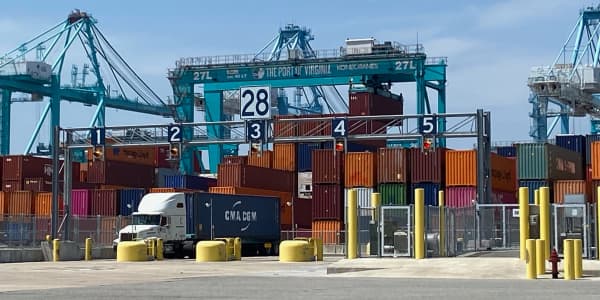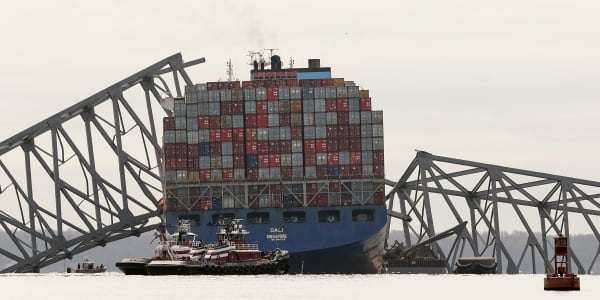President Biden is signing the bipartisan Ocean Reform Act on Thursday afternoon, the first major revision of U.S. maritime regulation in more than twenty years. The Biden administration says the new law will help reduce costs for families and ensure fair treatment for American businesses including the agriculture industry.
The bill addresses the high detention and demurrage (late fees) charged by the ocean carriers and terminals which are paid by importers and exporters. These charges are then passed on to the consumer, adding to inflation.
The Federal Maritime Commission, the agency in charge of the facilitation of U.S. waterborne trade, will now have more tools so it can move forward on recommendations made by FMC Commissioner Rebecca Dye in her two-year fact-finding investigation into ocean shipping supply chain issues during the pandemic. There is also additional legislation protecting the U.S. importer or exporter from any retaliation.
"I am bullish on the bill restoring credibility to the supply chain," said Dan Maffei, chairman of the FMC. "In terms of detention and demurrage (D&D) charges, [the bill] gives us the authority we need. We don't want to go too far. Not all D&D charges are unreasonable."
Terminals filled with containers are being used as storage because of the lack of warehouse space, and carriers need to have the ability to charge these fees, Maffei said, but they must be charged in a reasonable way that incentivizes movement.
"We will write the best rule we can to mandate that, and we will monitor the industry and adjust it if we need to. You don't know until you do it. This legislation is not the end all be all, but it will restore confidence in the supply chain," he said.
Another key piece to the law is the ocean carriers providing a detailed quarterly inventory of their loaded exports, loaded imports, and empty export containers.
As CNBC previously reported, ocean carriers have been denying U.S. loaded exports in favor of sending back empty containers only to be filled with Chinese exports. In a recent investigation, the two ocean carriers who refused the most loaded U.S. exports were the Chinese government-owned and operated OOCL and COSCO.

American-based brands and retailers supported the Ocean Shipping Reform Act.
"The bill is being signed just 72 hours after being passed by Congress which shows that the administration wants these enforcements to turn on immediately to protect American consumers and American businesses," said Steve Lamar, CEO of the American Apparel and Footwear Association. "The bill will directly address price gouging in the ocean shipping industry, which played a large role in the empty shelves, late deliveries, and increased prices American consumers have faced during the past year, and will protect American companies from predatory practices that threaten their businesses."
The National Retail Federal also championed the bill.
"We applaud the President for supporting and quickly signing the Ocean Shipping Reform Act," NRF President and CEO Matthew Shay said. "Signing OSRA will provide the FMC with the additional authority it needs to address unfair business practices that have existed for decades and have been exacerbated by the pandemic. These improvements come at a critical time when inflation has reached a 40-year high and will help ease pressure on American businesses, workers, and consumers."
Both Lamar and Shay will attend the signing ceremony.
In the President's State of the Union address, Biden described the ocean carriers' container rates and practices as "unfair" and called on Congress to take action.
In a statement on the Act, the Biden Administration said, "During the pandemic, ocean carriers increased their prices by as much as 1,000%. And, too often, these ocean carriers are refusing to take American exports back to Asia, leaving with empty containers instead. That's costing farmers and ranchers — and our economy — a lot of money."
Maffei has publicly discussed the increase in rates as a reflection of the free markets and supply and demand. Maffei has also addressed the issue of blank (canceled) sailings which would influence container prices.
"We continue to look for any artificial lowering of supply for a potential violation and if we find there is a negotiation of price amongst alliance members that is not in their agreement, we will act," said Maffei. "We are giving it a lot of scrutiny. The market today is more concentrated. When the president says 'from 20 to nine,' he means importers and exporters now have effectively half as many choices as they once did, so we need to make sure the industry is on a level playing field."
The bill would also enable the FMC to register shipping exchanges and look into the intermodal chassis pool and chassis supply. Currently, the terminal and road dwell times for chassis are up at the Port of Los Angeles as a result of containers using the chassis as makeshift warehouses due to a lack of importer warehouse capacity.
Correction: The Ocean Reform Act is the first major revision of maritime legislation since the passage of the Ocean Shipping Reform Act of 1998.





